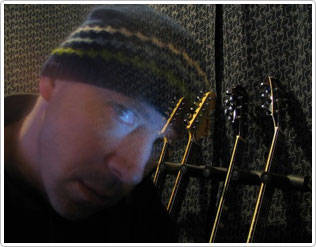Notes From Composer Dan Ross
A few words from composer Daniel Ross about the music for the series...
Scoring Robson Arms
The challenging, yet inspiring, thing about creating music for Robson Arms is the way the story can shift from comic, to poignant, to tragic, and back to comic before you know what hit you. I love that about this show - even though it makes it tricky to score at times. Quite early on, during Season 1 pre-production, I hit on the idea of the score being directly connected to the Robson Arms building - the structure itself - as a sort of musical container or crucible that sees all, hears all, assimilating the quirks and eccentricities of it's colourful occupants.
Scoring from the "perspective" of the building, as if it is the source of the music, I find that a certain attitude about each of the characters and their situations naturally emerges. The instruments I use all feel to me as if they might have been owned and played by faceless anonymous tenants from years past, stashed in closets, or leaking strained practice notes into the hallways. In fact a lot of the actual instruments I do play have very unique histories. The accordion belonged to the father of our "Tall Troubadour" Tom Saunders, and one of my favourite harmonicas is a very old crusty little device handed down to me from my Grandpa. Another regularly featured piece is a wonderful old "Beverley" marching snare drum that a friend has kindly let me keep around.
I always draw inspiration from the scratches, dents, and cracks in these old instruments, and when the Robson Arms narrative takes it's comedic, dramatic, or even tragic turns, I like to think that the old building itself is responding musically to the characters' situation - pining for connection; whimsically chuckling at the various comic mishaps, or empathizing with cathartic experiences and epiphanies.
Finding The Sound
Back at the dawn of Season 1, through a sort of elimination process, we arrived at a very specific, and relatively simple pallet of sounds which I've stuck with through all 3 Seasons. The ensemble consists of piano, upright bass, accordion, harmonica, mandolin, music box, vibraphone, and brushed drum kit. For Season 3, I've added the Hammond organ as a regular featured instrument, which adds a distinct bit of 'attitude' when needed.

Occasionally, an exception is made and banjo, timpani, guitar, xaphoon (a clarinet-like instrument), or even a Melotron can be heard (a vintage machine utilizing tape loops of flutes and strings).
But generally, I like to keep it sounding natural, "woody" and human - like the building itself. Sometimes I have to swerve right off the map to create a specific musical story requirement, and this ultimately means we end up with quite an eclectic range of music.
For Season 3, the styles used stretch from the lo-fidelity cheese of doctor's office canned music, up to the more complex requirements of opera (yes, opera!). Latin influences also permeate the score for Season 3 more than ever, as a result of the arrival of new owners Chuck and Trixie.
Jamming With The Troubadours
As I've done in Seasons 1 & 2, I again have the pleasure of working directly with the on-screen Troubadours played by Tom Saunders & Jason Dedrick. As music producer/arranger, I collaborate with Tom and Jason to deliver finished versions of their songs that are performed on camera as part of each episode. We first create a provisional version of each song during pre-production for them to perform. Then, before I deliver the final score for each episode, I also complete the finished arrangement of Tom and Jason's song.
To me, the Troubadours feel somehow mystically connected to the Robson Arms building, so it seems natural there should be a cross-pollination of their sound with the score. In recording and arranging their songs, I generally use the same collection of sounds heard in the score, but for Season 3, we've bent this rule a bit, and the instrumentation has been more adventurous, including a big marching bass drum, trombone, saxophone, and even the bizarre Omnichord (a funky little retro synthesizer).
Another twist is that in Seasons 1 and 2, The Troubadours always appear at the beginning of each episode, but for Season 3, this has evolved into them popping up in various places throughout any given episode. Often a song is required to be deftly woven into or around characters' dialogue, and the challenge of fitting the Troubadours seamlessly into the narrative has definitely kept us on our toes. This season, in a bizarre twist, I also created an opera sequence for them to perform based on the lyrics from Susin Nielsen's script "I Pagliacci" (episode 304). You never know quite what to expect from a show like Robson Arms!
Season 3 also contains some amazing songs from 'outside' artists, so keep those ears tuned!